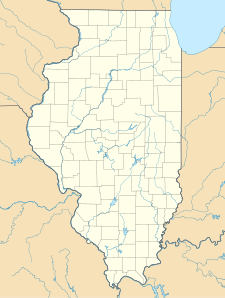Fort Massac
| Fort Massac State Park | |
|---|---|
|
IUCN category III (natural monument or feature)
|
|

The 2002 reconstruction of the 1802 Fort Massac, with the Ohio River in the background. The original, 1757 French fort foundation impression, can be seen on the far right, beyond the trees.
|
|
|
Map of the U.S. state of Illinois showing the location of Fort Massac State Park
|
|
| Location | Massac County, Illinois, USA |
| Nearest city | Metropolis, Illinois |
| Coordinates | 37°08′38″N 88°41′14″W / 37.14389°N 88.68722°WCoordinates: 37°08′38″N 88°41′14″W / 37.14389°N 88.68722°W |
| Area | 1,450 acres (587 ha) |
| Established | 1908 |
| Governing body | |
|
Fort Massac Site
|
|
| Nearest city | Metropolis, Illinois |
| Built | 1757 |
| NRHP Reference # | 71000293 |
| Added to NRHP | July 14, 1971 |
Illinois Department of Natural Resources
Fort Massac (or Fort Massiac) is a colonial and early National-era fort on the Ohio River in Massac County, Illinois, United States.
Legend has it that, as early as 1540, the Spanish explorer Hernando de Soto and his soldiers constructed a primitive fortification here to defend themselves from native attack. Maps from the early 18th century show an "Ancien Fort" ("Old Fort") near this location.
Fort Massac was built by the French in 1757, during the French and Indian War and was originally called "Fort de L’Ascension." The name was changed in 1759, to honor of Claud Louis d'Espinchal, Marquis de Massiac, the French Naval Minister. (Massiac is a place in the Communes of the Cantal department in France.) Many early 19th-century sources claim that "Massac" was derived from a "massacre" that occurred at the site; but there is no record of such a massacre.
Following the end of the French and Indian War in 1763, the French abandoned the fort and a band of Chickasaw burned it to the ground. When Captain Thomas Stirling, commander of the 42nd Highland Regiment, arrived to take possession for Britain, he found nothing but a charred ruin.
The British never rebuilt the fort. In 1778, during the American Revolutionary War, Col. George Rogers Clark led his regiment of “Long Knives” into Illinois near the fort at Massac Creek. In 1794, during the Northwest Indian War, President George Washington ordered the fort rebuilt, and for the next 20 years it protected U.S. military and commercial interests in the Ohio Valley.
...
Wikipedia



